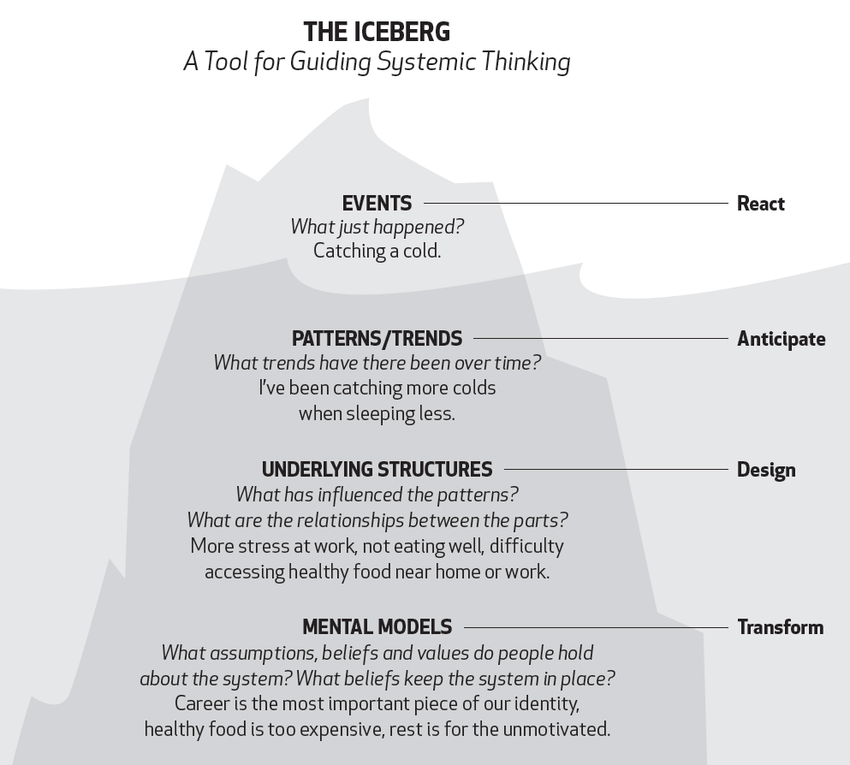When thinking about climate change, planting trees and pursuing reforestation to sequester carbon is usually seen as a great idea. However, a recent article in the New York Times “Tree Planting Is Booming. Here’s How That Could Help, or Harm, the Planet” describes how simply planting trees could not necessarily lead to the expected results of mitigating climate change and it could even make other problems worse. This is because Climate Change is an extremely complex systemic process consisting of numerous interactions among many parts (and systems). Identifying the consequences of changing even a single part is extremely difficult and even more understanding all the ways in which this process evolves and affects other systems. In this situation, adopting a linear mode of thinking (i.e. cause-effect) is rarely useful and it could sometimes even be dangerous.
 When dealing with complex systems, it is better to substitute this linear approach with the systems thinking method. Systems Thinking analyzes and studies systems in a holistic non-linear way so that proposed interventions take into consideration as many indirect and feedback effects as possible. While it was developed for complex systems such as construction, software development, and policy design, this method could be very helpful also at the personal and local levels. Often, we treat only the symptoms of a problem (i.e. I have a headache, I take a painkiller) without trying to identify and address the root causes of the problem. Moreover, often we might choose actions that solve one problem without considering how they could create new problems or change our systems (i.e. body, family, work situation) in deep ways. Going back to the headache problem: When do I get a headache? – When I drink too little / not sleep enough / sit in a certain chair for too long / am stressed? – If I drink more and I suffer less from headaches, I can ask: what is preventing me from drinking more? How can I make drinking easier for me? But I also need to think about how drinking more can affect my systems and other possible causes: to drink more I need to get up from my chair more often to refill my glass and this is good because it allows me to stretch a little. However, I also need to use the restroom more often and I am worried my supervisor might be upset about it, therefore, my stress level increases possibly leading to a headache, and so on.
When dealing with complex systems, it is better to substitute this linear approach with the systems thinking method. Systems Thinking analyzes and studies systems in a holistic non-linear way so that proposed interventions take into consideration as many indirect and feedback effects as possible. While it was developed for complex systems such as construction, software development, and policy design, this method could be very helpful also at the personal and local levels. Often, we treat only the symptoms of a problem (i.e. I have a headache, I take a painkiller) without trying to identify and address the root causes of the problem. Moreover, often we might choose actions that solve one problem without considering how they could create new problems or change our systems (i.e. body, family, work situation) in deep ways. Going back to the headache problem: When do I get a headache? – When I drink too little / not sleep enough / sit in a certain chair for too long / am stressed? – If I drink more and I suffer less from headaches, I can ask: what is preventing me from drinking more? How can I make drinking easier for me? But I also need to think about how drinking more can affect my systems and other possible causes: to drink more I need to get up from my chair more often to refill my glass and this is good because it allows me to stretch a little. However, I also need to use the restroom more often and I am worried my supervisor might be upset about it, therefore, my stress level increases possibly leading to a headache, and so on.
While systems thinking might seem exoteric and it requires more effort than simply treating the symptoms, it can have a meaningful and long-lasting impact on the quality of our life. We here at the One Health Center apply this method to many of our research and activities, and even have a dedicated graduate course titled Systems Thinking in One Health. Visit our website to learn more!
By Dr. Luca Mantegazza, Research Program Coordinator
 3
3
